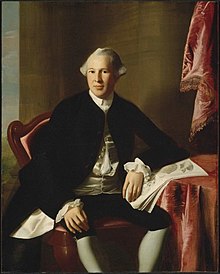Our website is made possible by displaying online advertisements to our visitors.
Please consider supporting us by disabling your ad blocker.
Joseph Warren
Joseph Warren | |
|---|---|
 Portrait of Warren by John Singleton Copley, c. 1765 | |
| 2nd President of the Massachusetts Provincial Congress | |
| In office May 2, 1775 – June 17, 1775 | |
| Preceded by | John Hancock |
| Succeeded by | James Warren |
| Personal details | |
| Born | June 11, 1741 Roxbury, Province of Massachusetts Bay, British America |
| Died | June 17, 1775 (aged 34) Breed's Hill, Charlestown, Province of Massachusetts Bay, British America |
| Cause of death | Killed in action |
| Resting place | Forest Hills Cemetery |
| Spouse |
Elizabeth Hooten
(m. 1764; died 1773) |
| Relations | Mercy Scollay (fiancée) |
| Children | Elizabeth, Joseph, Mary, and Richard |
| Education | Roxbury Latin School |
| Alma mater | Harvard College |
| Occupation | Physician |
| Signature | |
| Military service | |
| Allegiance | |
| Branch/service | |
| Years of service | 1775 |
| Rank | Militiaman Major general |
| Battles/wars | |
Joseph Warren (June 11, 1741 – June 17, 1775), a Founding Father of the United States, was an American physician who was one of the most important figures in the Patriot movement in Boston during the early days of the American Revolution, eventually serving as President of the revolutionary Massachusetts Provincial Congress. Warren enlisted Paul Revere and William Dawes on April 18, 1775, to leave Boston and spread the alarm that the British garrison in Boston was setting out to raid the town of Concord and arrest rebel leaders John Hancock and Samuel Adams. Warren participated in the Battles of Lexington and Concord the following day, the opening engagements of the American Revolutionary War.[1]
Warren had been commissioned a major general in the colony's militia shortly before the June 17, 1775 Battle of Bunker Hill. Rather than exercise his rank, Warren chose to participate in the battle as a private soldier, and was killed in combat when British troops stormed the redoubt atop Breed's Hill. His death, immortalized in John Trumbull's painting, The Death of General Warren at the Battle of Bunker's Hill, June 17, 1775, galvanized the rebel forces. Warren has been memorialized in the naming of many towns, counties, streets, and other locations in the United States, by statues, and in numerous other ways.
- ^ Kelly, Howard A.; Burrage, Walter L. (eds.). . . Baltimore: The Norman, Remington Company.
Previous Page Next Page


